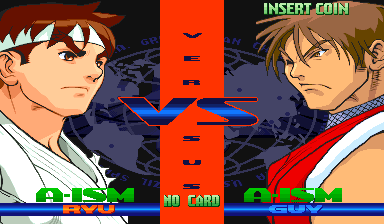Street Fighter Alpha 3 (Arcade)
| Street Fighter Alpha 3 |
|---|
|
Also known as: Street Fighter Zero 3 (JP)
|
| This page is rather stubbly and could use some expansion. Are you a bad enough dude to rescue this article? |
The third entry of Capcom's secondary Street Fighter series, driven to near-obsolescence by its console versions.
| To do: Sample Version has been dumped. Document the debug menus exclusive to this build. |
Contents
Unused Graphics
Stage Markers
Active markers for Stages 10-12, and passive ones for 11 and 12. The "ladder" never shows more than 10 spots, nor does it appear before Stage 10. It was probably thought that 12 stages would have been too long, and was therefore snipped down to 10.
Name markers for Juli and Juni, as well as both for the boss battle. It is not possible in this version to fight Juli or Juni individually in 1P mode, and as stated above the latter would not be shown beforehand if fighting them both in the final stage.
The individual markers would later find use in the expanded console versions, if playing as bonus characters T. Hawk (fights Juli in Stage 9) or Evil Ryu (can fight them as normal opponents), or if picking Juli and/or Juni in A/B Dramatic battle (the single fight will always be against one of the characters selected due to software limitation).
The Juli/Juni marker was likely intended for use in a special mode, but the only other one to use the latter is Dramatic (two-on-one), in which any fights against the both of them cannot be accommodated.
Select Screen Icon
This icon, for both Juli and Juni, is never used at all. The idea was probably that they would be jointly playable in early stages of development, but they ended up getting split up in the final. The reason is either because it would have been unfair, or a question of how the player would be able to pick the one of these two they wanted to control.
Unused Theme
Track 001B in the sound test, while only used in the attract mode here, went on to become the theme of bonus character Shin Akuma in the later ports. It is fairly likely that he was going to be included in this version, along with Evil Ryu (whose theme is also present and actually used, when Bison fights Ryu).
Regional Changes
Zero/Alpha
To reflect the change of title, these changes were made.
| Japan | International |
|---|---|
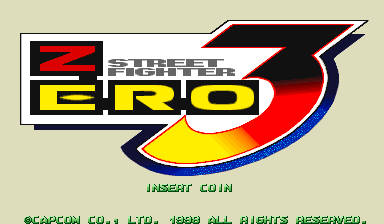 |
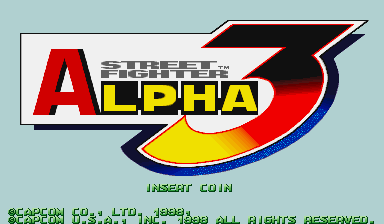 |
Following in the footsteps of its predessors, the game is known as Street Fighter Zero 3 in Japan, and as Street Fighter Alpha 3 outside Japan.
| Japan/Asia | Europe/US/Brazil/Hispanic |
|---|---|
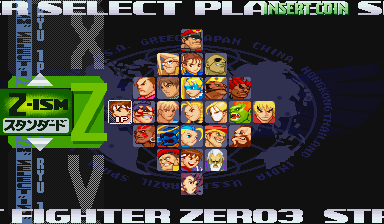 |
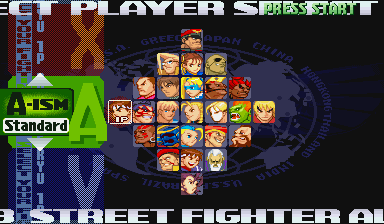 |
The gauge "Z-Ism" (Zero) became "A-Ism" (Alpha). (In the Asian version, the Z-Ism descriptor is in English.) Also, looking closer, the vertical text slider reads SELECT "ISM" in the Japan/Asia versions and SELECT YOUR FIGHTING STYLE in all others.
| Japan/Asia | Europe/US/Brazil/Hispanic |
|---|---|
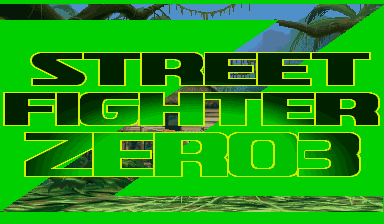 |
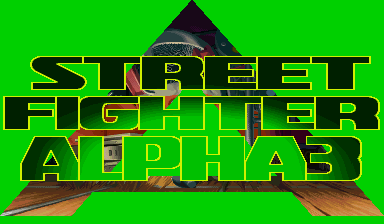 |
The segue screen that appears before the beginning of each fight.
Startup
| Japan/Asia | Europe/US/Brazil/Hispanic |
|---|---|
Title Screen
| Japan/Asia | Europe/US/Brazil/Hispanic |
|---|---|
The announcer's clips were also changed accordingly.
Japanese Version-Exclusive Win Quotes
The Japanese version has extra character-specific win quotes that all go unused in the International version.
Capcom Card Dispenser
Much like with the previous game, this game had functionality for the Capcom Card Dispenser in Hispanic and Brazil regions. Once gameplay was complete, the game would give players a collectible card with a picture of a fighter on it.[2] If there's no cards in the dispenser or if the card dispenser isn't hooked up but the DIP switch was enabled, the game would constantly display "NO CARD" on all screens after booting.
Other Differences
- Different regions start with different default Game Speed settings:
- US sample version 090616 and all Japan versions have Game Speed set to "Turbo 1".
- All Brazil, Hispanic, and US versions (aside from the Sample Version) start with Game Speed set to "Turbo 2".
- All Asian versions and the sole Euro version start with Game Speed set to "Free 1".
Regulation Setting
The game has a regulation setting that makes the game slightly less gory in a few aspects. By default, this setting is turned on in the test menu, except in the Japanese version.
Most of the "regulation off" effects are shown on the PSP port. The regulation setting also exists in the Alpha Anthology compilation for PlayStation 2.
Zangief's Pre-Stage Picture
| Regulation Off | Regulation On |
|---|---|
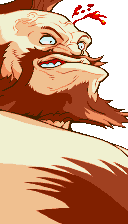 |
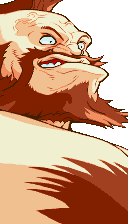 |
A spurt of blood that erupts from Zangief's head is removed if Regulation is set to On.
Dictator's Defeat
| Regulation Off | Regulation On |
|---|---|
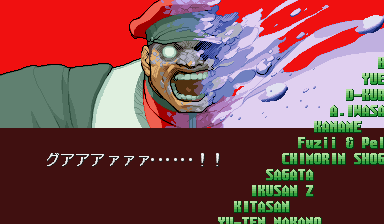 |
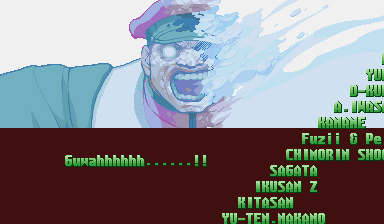 |
Most of the characters' Arcade Mode endings have M. Bison (Vega in Japan) being defeated. If Regulation is set to Off, Dictator bleeds large blobs of blood. This doesn't happen if the setting is set to On. The background color is red when Regulation is set to Off, and white if set to On.
Rose's Ending
| Regulation Off | Regulation On |
|---|---|
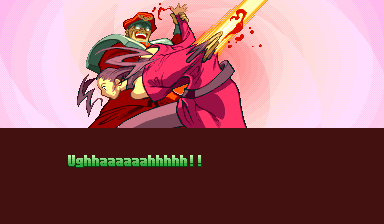 |
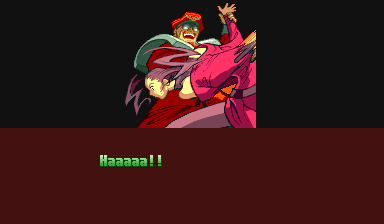 |
When Regulation is set to on, Rose's blood splatter is removed, the background doesn't display a red X-Ism super finish effect, and part of the picture is cut off so the player can't see Dictator's hand blasting through Rose's abdomen.
However, the PlayStation and PSP ports restore some of the blood.
Revisional Differences
Karin's Yashiro Kuzushi Throw
| Normal Mode | Saikyo Mode |
|---|---|
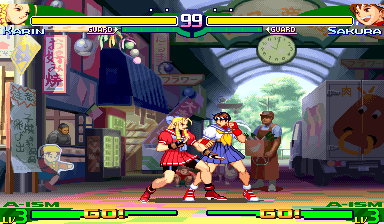 |
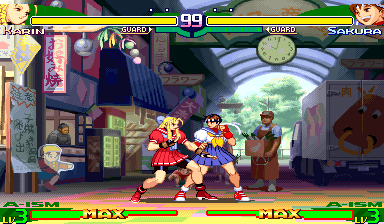 |
In all regional versions of the game prior to Japan/Asia version 980904 (except the US Sample Version 980616, oddly), if playing as Karin in Saikyo Mode, her Yashiro Kuzushi throws (ground and air) had the unique ability to completely drain the opponent's life bar after the initial hit. It seems to trigger when the opponent gains invulnerability after being knocked down -- denoted by the Guard Meter flashing. Why this happens is anyone's guess, however.
Juni & Juli's True Death Cross Dance
| Normal Mode | Saikyo Mode |
|---|---|
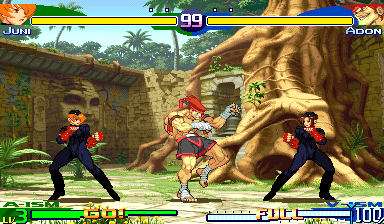 |
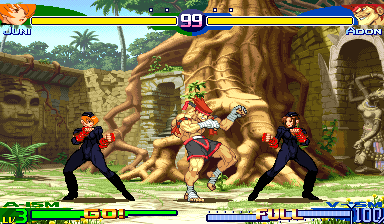 |
Similarly, if playing as both Juni and Juli in Dramatic Battle Mode, if either character is in Saikyo Mode, their Death Cross Dance will instantly do 80% damage to the opponent before doing the normal 17-hits worth of light damage. As expected, this was also fixed by Japan/Asia version 980904.
References
- Pages missing developer references
- Games developed by Capcom
- Pages missing publisher references
- Games published by Capcom
- Arcade games
- Games released in 1998
- Games released in July
- Games with unused graphics
- Games with unused music
- Games with regional differences
- Games with revisional differences
- Stubs
- To do
- Street Fighter series
Cleanup > Pages missing developer references
Cleanup > Pages missing publisher references
Cleanup > Stubs
Cleanup > To do
Games > Games by content > Games with regional differences
Games > Games by content > Games with revisional differences
Games > Games by content > Games with unused graphics
Games > Games by content > Games with unused music
Games > Games by developer > Games developed by Capcom
Games > Games by platform > Arcade games
Games > Games by publisher > Games published by Capcom
Games > Games by release date > Games released in 1998
Games > Games by release date > Games released in July
Games > Games by series > Street Fighter series
